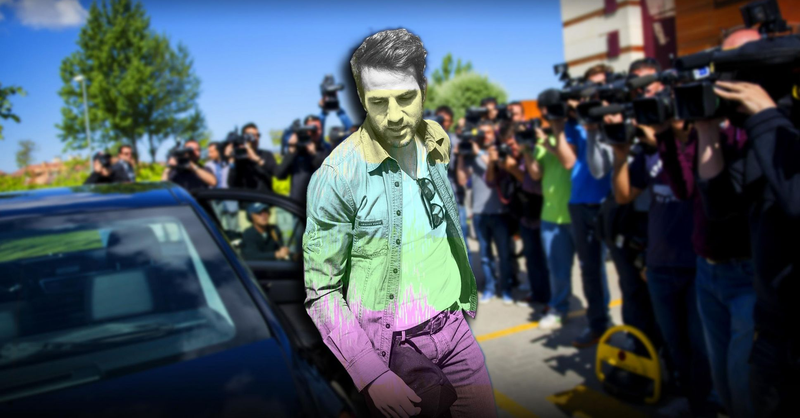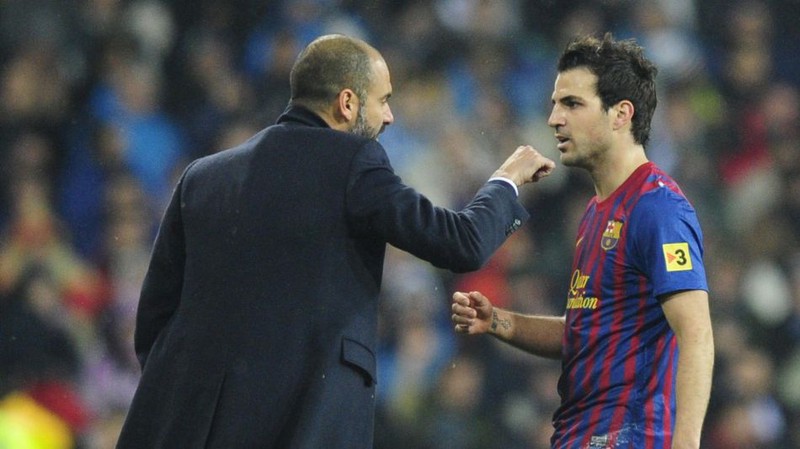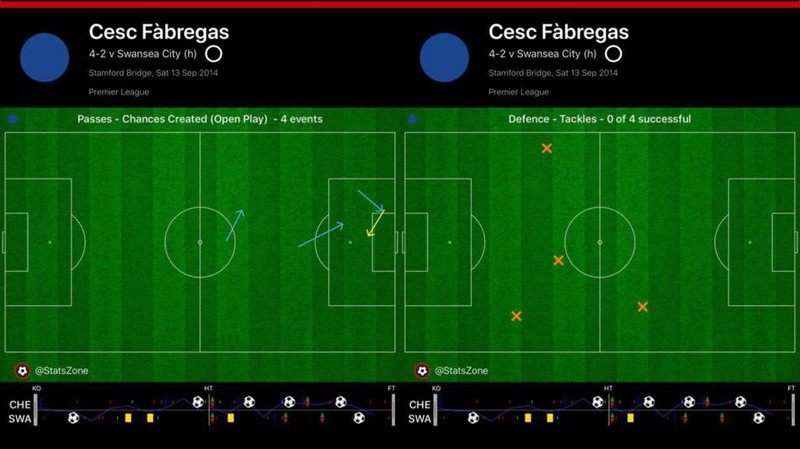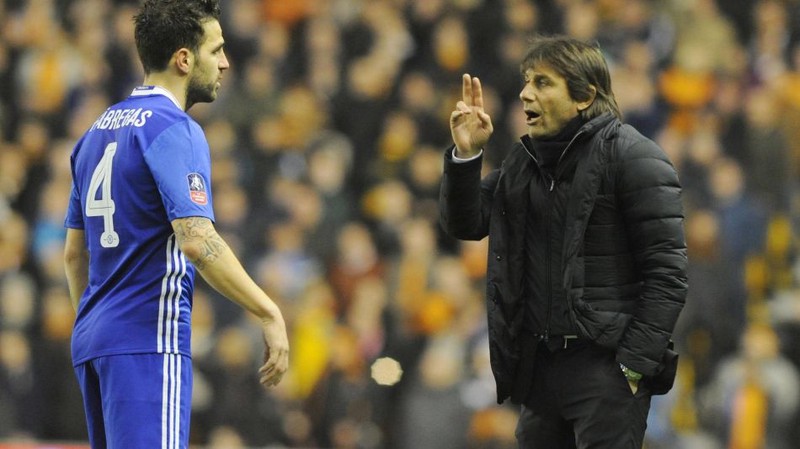Only one top season after leaving Arsenal.

The adventures of Cesc Fabregas in January perfectly symbolize the last years of his career. Earlier this month, Thierry Henry asked a friend to help Monaco - the Spaniard could not: just two weeks after the transfer, the Frenchman was fired from his first independent work. Of course, Cesc simply did not have time to settle down in a new place, but perhaps all the last coaches of Fabregas regretted that they had acquired it.
The fall of the Spaniard is easily explained by the theory of Wayne Rooney and Fernando Torres. She puts forward the original version - players who burst into adult football early, are rapidly fading away by 30 years. Fabregas fits perfectly into the age frame (Cesc is only 31 years old), but his recession also has a tactical side.
The Spaniard left Arsenal in the status of the best creative artist on the planet. In the period from 2006 to 2011, Cesc made the most assists and created more of all the moments in the top five leagues. In recalculation for 90 minutes, Fabregas was also the best.
Cesc's performance stood out for at least two reasons. First of all, Fabregas played in a team with Bendtner, Van Persie and Eduardo - they were either unstable, or they had a lot of stunts. Secondly, Cesc was responsible not only for the creation - along with Mathieu Flamini, the Spaniard patrolled the support zone. Despite the middle class of performers, a bunch of functions across the field and injuries, Fabregas gave a chic 15 + 13 in the penultimate season for Arsenal.
“Barcelona” was buying, perhaps, the best young midfielder of the world at that time. Moreover, he was the best passer in the entire history of the Premier League.”- Ted Knutson, an employee of the statistical company StatsBomb, explained how good Fabregas was before returning home.
According to an insider, Fabregas was to become Xavi’s long-term heir. Pep Guardiola saw in Cesc an opportunity to make Barça more flexible in terms of tactics. Whatever the task of Fabregas, he had all the introductory - he received a football education in La Masia, problems with adaptation could not arise even in theory.
Despite this advantage over the other Barca newbies, Cesc failed. This is partly due to his power in the Arsenal - performing a bunch of tasks in the Premier League, he trivially forgot what the main principles of Barcelona are based on. But his instincts could not be suppressed even with time and after individual conversations.
The key dissonance is Cesc's desire to constantly work with the ball and sharpen the game, even when it is not necessary. This is not consistent with the philosophy of Guardiola, who asked to abide by the position, trust partners and methodically loosen the defense. By hitting the ball, Fabregas destroyed his ideas and made life easier for his rivals.

The best segment of Fabregas coincided with the transition of Barcelona to 3-4-3. Cesc received the role of a false nines, scored a lot and assisted, but only because Guardiola did not want to break the usual rally - sending the Spaniard to the attack, he partially succeeded. It is even indicative that Pep left a year after the transfer of Fabregas.
“The requirements for the Barcelona midfielders are tied to discipline and a tactical approach to the game. Guardiola has long convinced Cesc to do what the team needs, but it seems he could not do it to the end,” - argued Guillem Balague.
A similar picture emerged with Tito Vilanova - Fabregas scored 22 points in the goal + pass system, but the team failed in Europe. Tata Martino freed Cesc from the work that had been imposed on him by previous Barca coaches, but this was not enough. The worst segment for the generation of Xavi, Busquets and Iniesta coincided with the stay of Fabregas in the club.
Going to Chelsea charged Cesc with new energy, but only for half a year. In the summer of 2014, Jose Mourinho led not only Fabregas, but also Diego Costa. Together, they had to solve the problems of "the Blues” at the gates of others, and build a bundle for the Portuguese team in the attack.
Cesc succeeded: he made 19 assists and at some point even threatened to break the Henri record. His chip was long-distance casts from the support zone - as a rule, on Costa or Hazard. Later, Eden said: if he had a vision of the Fabregas field, he could fly to heaven.
“He takes the ball, does not look ahead, but cuts the pass exactly where you need it - behind the back of the defender. Sometimes I ask myself: "How did he see it, how did he do it at all?" He has really incredible passes," - the Belgian admired.
The first problems of Cesc noticed Gary Neville. It is symbolic that expert Sky rolled out the harsh verdict after the third match of the season against Swansea. Neville was not even embarrassed by the fact that Fabregas made two assistants - according to Gary, the Spaniard too often falls into the support zone and destroys the game balance.
“He plays in conjunction with Matic, but has no right to do the things he does as a defender. He has no discipline, he follows the ball, does not look behind him. Because of this, rivals have too much space in the Chelsea backbone - more serious clubs will take advantage of this,” - Neville warned.

The arrival of Fabregas made that Chelsea, perhaps the most open team in Mourinho’s career. Jose realized what a threat it carries to a potential champion title - despite a decent lead over his pursuers, the Portuguese transferred Cesc to "the ten" in the second half of the season. There, his performance dropped markedly: before the New Year, the Spaniard made 14 assists, after only five. Henry record resisted.
The next season, Mourinho returned to the experiment, but this resulted in a terrible crisis. Because of the horrors of Fabregas, Matic worked for two, because of the horrors of Hazard, for three. Nemanja was torn between two leaders, who again destroyed the balance, but this time did not compensate for this by playing in an attack. Not having solved the dilemma, Mourinho lost first the locker room, and then the job.
Antonio Conte was more prudent - the Italian built a support zone from Matic and Kante, and asked Fabregas to add protection all season. Despite the fact that the Spaniard helped open the game after exits from the bench, Conte did not allow Cescou to return to the start.
“Cesc is included in my plans as well as in Chelsea’s plans. We all know how good he is. I see him at every workout, he always makes great efforts. If he continues in this way, it will be hard for me to keep him in stock. But I don’t want to let out a player, and then think about whether I did everything right,” - noted Conte.
After the sale of Matić to the Man United, the Italian wanted to make Chelsea bolder, but Fabregas did not use the chance. The team has seriously weakened in defense; to make the midfield with Cesc more reliable, Conte refused 3-4-3, with which he won the title. Without it, Chelsea lost an additional player ahead - both the defense and the attack suffered from the desire to place Fabregas. Episodic manifestations of Cesc's genius were replaced by his usual defects.

The departure of Fabregas to the era of disciplined playmakers in the Premier League perfectly illustrates the picture. Due to the lack of physics, Cesc is inferior to players like De Bruyne and Eriksen. The Dane three years ago rightly remarked: if earlier playmakers could do anything, now they are obliged to defend themselves and put pressure on a par with the rest. Fabregas is simply not capable of this.
The enigma of Fabregas is even in position. He can not play in the reference area, because he looks at the ball and does not control the situation behind his back. He cannot play box-to-box because of weak legs. He can not even play "the ten", because he always pulls the ball into the depths of the field. Attempting to place Cesc on the field is always a risk management task.
As Guardiola aptly put it, no one will be able to give such a pass behind his back, like Fabregas - for the ball there is no more special player at this moment. But Cesc's problem is that the player has the ball for only three minutes per match. This is too much luxury for top clubs - and the point is not about money.
Comments